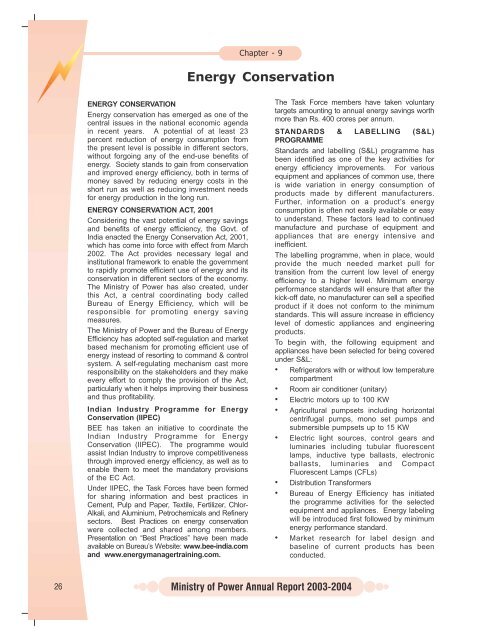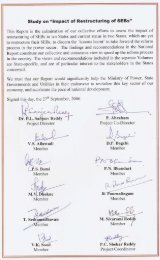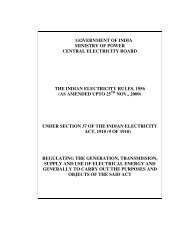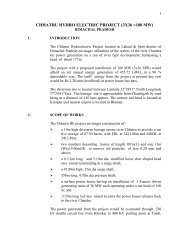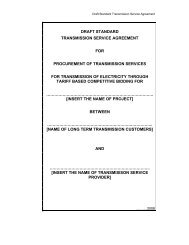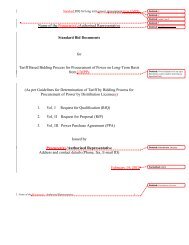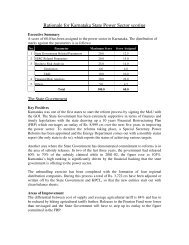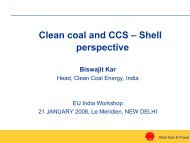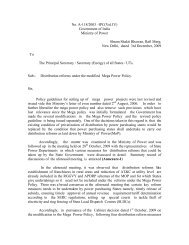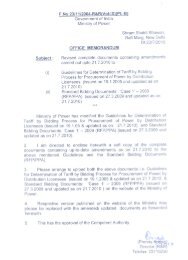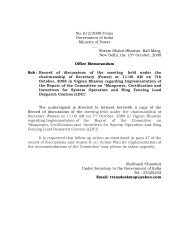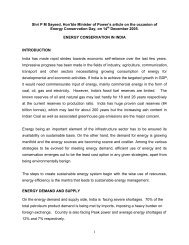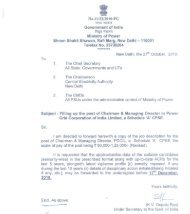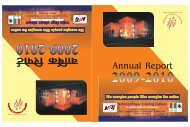Untitled - Ministry of Power
Untitled - Ministry of Power
Untitled - Ministry of Power
Create successful ePaper yourself
Turn your PDF publications into a flip-book with our unique Google optimized e-Paper software.
26<br />
ENERGY CONSERVATION<br />
Energy conservation has emerged as one <strong>of</strong> the<br />
central issues in the national economic agenda<br />
in recent years. A potential <strong>of</strong> at least 23<br />
percent reduction <strong>of</strong> energy consumption from<br />
the present level is possible in different sectors,<br />
without forgoing any <strong>of</strong> the end-use benefits <strong>of</strong><br />
energy. Society stands to gain from conservation<br />
and improved energy efficiency, both in terms <strong>of</strong><br />
money saved by reducing energy costs in the<br />
short run as well as reducing investment needs<br />
for energy production in the long run.<br />
ENERGY CONSERVATION ACT, 2001<br />
Considering the vast potential <strong>of</strong> energy savings<br />
and benefits <strong>of</strong> energy efficiency, the Govt. <strong>of</strong><br />
India enacted the Energy Conservation Act, 2001,<br />
which has come into force with effect from March<br />
2002. The Act provides necessary legal and<br />
institutional framework to enable the government<br />
to rapidly promote efficient use <strong>of</strong> energy and its<br />
conservation in different sectors <strong>of</strong> the economy.<br />
The <strong>Ministry</strong> <strong>of</strong> <strong>Power</strong> has also created, under<br />
this Act, a central coordinating body called<br />
Bureau <strong>of</strong> Energy Efficiency, which will be<br />
responsible for promoting energy saving<br />
measures.<br />
The <strong>Ministry</strong> <strong>of</strong> <strong>Power</strong> and the Bureau <strong>of</strong> Energy<br />
Efficiency has adopted self-regulation and market<br />
based mechanism for promoting efficient use <strong>of</strong><br />
energy instead <strong>of</strong> resorting to command & control<br />
system. A self-regulating mechanism cast more<br />
responsibility on the stakeholders and they make<br />
every effort to comply the provision <strong>of</strong> the Act,<br />
particularly when it helps improving their business<br />
and thus pr<strong>of</strong>itability.<br />
Indian Industry Programme for Energy<br />
Conservation (IIPEC)<br />
BEE has taken an initiative to coordinate the<br />
Indian Industry Programme for Energy<br />
Conservation (IIPEC). The programme would<br />
assist Indian Industry to improve competitiveness<br />
through improved energy efficiency, as well as to<br />
enable them to meet the mandatory provisions<br />
<strong>of</strong> the EC Act.<br />
Under IIPEC, the Task Forces have been formed<br />
for sharing information and best practices in<br />
Cement, Pulp and Paper, Textile, Fertilizer, Chlor-<br />
Alkali, and Aluminium, Petrochemicals and Refinery<br />
sectors. Best Practices on energy conservation<br />
were collected and shared among members.<br />
Presentation on “Best Practices” have been made<br />
available on Bureau’s Website: www.bee-india.com<br />
and www.energymanagertraining.com.<br />
Chapter - 9<br />
Energy Conservation<br />
The Task Force members have taken voluntary<br />
targets amounting to annual energy savings worth<br />
more than Rs. 400 crores per annum.<br />
STANDARDS & LABELLING (S&L)<br />
PROGRAMME<br />
Standards and labelling (S&L) programme has<br />
been identified as one <strong>of</strong> the key activities for<br />
energy efficiency improvements. For various<br />
equipment and appliances <strong>of</strong> common use, there<br />
is wide variation in energy consumption <strong>of</strong><br />
products made by different manufacturers.<br />
Further, information on a product’s energy<br />
consumption is <strong>of</strong>ten not easily available or easy<br />
to understand. These factors lead to continued<br />
manufacture and purchase <strong>of</strong> equipment and<br />
appliances that are energy intensive and<br />
inefficient.<br />
The labelling programme, when in place, would<br />
provide the much needed market pull for<br />
transition from the current low level <strong>of</strong> energy<br />
efficiency to a higher level. Minimum energy<br />
performance standards will ensure that after the<br />
kick-<strong>of</strong>f date, no manufacturer can sell a specified<br />
product if it does not conform to the minimum<br />
standards. This will assure increase in efficiency<br />
level <strong>of</strong> domestic appliances and engineering<br />
products.<br />
To begin with, the following equipment and<br />
appliances have been selected for being covered<br />
under S&L:<br />
Refrigerators with or without low temperature<br />
compartment<br />
Room air conditioner (unitary)<br />
Electric motors up to 100 KW<br />
Agricultural pumpsets including horizontal<br />
centrifugal pumps, mono set pumps and<br />
submersible pumpsets up to 15 KW<br />
Electric light sources, control gears and<br />
luminaries including tubular fluorescent<br />
lamps, inductive type ballasts, electronic<br />
ballasts, luminaries and Compact<br />
Fluorescent Lamps (CFLs)<br />
Distribution Transformers<br />
Bureau <strong>of</strong> Energy Efficiency has initiated<br />
the programme activities for the selected<br />
equipment and appliances. Energy labeling<br />
will be introduced first followed by minimum<br />
energy performance standard.<br />
Market research for label design and<br />
baseline <strong>of</strong> current products has been<br />
conducted.


